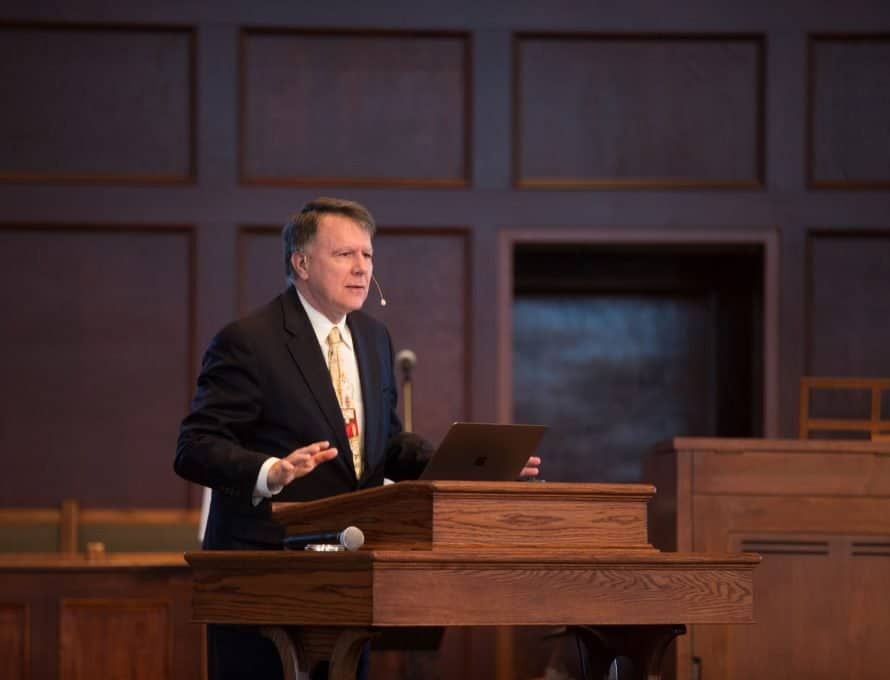Noted New Testament scholar Andreas Kostenberger delivered Midwestern Seminary’s annual Sizemore Lectures on March 13-14, emphasizing the importance of rightly studying biblical theology.
Kostenberger, who has served for more than 20 years as senior research professor of New Testament and Biblical Theology at Southeastern Baptist Theological Seminary, focused his two-lecture series on the topic, “The Promise and Practice of Biblical Theology.”
In the opening lecture, Kostenberger set out to explain what biblical theology is and what it isn’t. He provided a definition of biblical theology, saying, “Biblical theology is theology that is biblical – that is, biblical theology is not our own theology, or that of our church or denomination. It is the theology of the biblical writers themselves.”
He said the following important questions must be asked once a definition of biblical theology is clearly understood: “How do you know what the theology of the biblical writers is?” “What is your method?” and “Is ascertaining the theology of the biblical writers even a realistic goal?”
In determining the answers, Kostenberger noted the need to understand that each person brings presuppositions to the practice of studying biblical theology. He added that bringing presuppositions isn’t necessarily a bad thing, even if it results in an imperfect interpretation of a passage because then the whole of the scholarly community can come together in a mutual dialogue and critique to arrive at a more accurate understanding of that passage.
Kostenberger then transitioned the talk to what biblical theology isn’t, namely systematic theology. He provided a definition of systematic theology from the previous year’s Sizemore Lecturer, D.A. Carson. “Christian theology whose internal structure is…organized on atemporal principles of logic, order, and need.” It moves from subjects such as cosmology and bibliology to theology proper (God), Christology, soteriology…eschatology.
Systematic theology can be beneficial, Kostenberger said, but it also carries with it dangers. “We need to be careful to engage biblical theology first before moving on to systematic theology. In this way we can guard against the tendency to read our own questions and issues into the text.”
The final aspect of Kostenberger’s first lecture was to establish which method should be used when engaging in biblical theology. He noted that the method should be to study the biblical theology from a historical vantage point, done so inductively – paying specific attention to the actual words – and descriptively – accurately describing the convictions or beliefs of the biblical authors.
He added that there are four methods typically used in engaging biblical theology – studying a given book or corpus of Scripture, using a central themes approach, identifying the center of Scripture, and using a metanarrative or story approach.
Explaining that the central themes and the metanarrative methods can be helpful, Kostenberger called the book or corpus study the “classic approach.” He said, “I certainly think this is how we should continue to conceive of biblical theology as far as its essence is concerned.”
Day two of the lecture series saw Kostenberger providing practical application for studying biblical theology – offering four general guidelines for engaging biblical theology:
- Read through the book multiple times and take notes or mark up your Bible as you try to identify significant themes and emphases.
- In doing so, identify key passages where the biblical theology of a given book or corpus is most prominently enunciated, such as a preface, prologue, summary or conclusion.
- Identify prominent themes and distinctive theological emphases: in so doing, consider also important literary features such as strategic placement, repetition, structure, and/or emphasis.
- Develop a hierarchy of themes: determine which of the prominent themes you identified in the previous step are major overarching themes and which are sub themes.
Kostenberger then applied these steps to two case studies: the biblical theology of the letters to Timothy and Titus as well as a biblical theology of the Holy Spirit.
Ultimately, in differentiating between biblical theology and systemic theology, Kostenberger said, “If done well, biblical theology can give us an independent set of legs to stand on that allows us to get closer to the Bible and enables us to critique, and at times even correct, standard systematic theology treatments, especially when looking at a given Old Testament or New Testament book or corpus.
“Systematic theology endeavors to bring Scripture closer to our day by trying to find answers to questions we have today. By contrast, biblical theology tries to bring us closer to Scripture by helping us see what the biblical writers themselves believed so we can conform our beliefs to theirs.
“In this way, we submit to the authority of Scripture and allow it to set the agenda for us rather than domesticating Scripture and conforming it to our agenda, ideology, or culture.”
Kostenberger concluded saying, “If we come to the Bible prepared to submit to its authority, even where this is countercultural, we will be challenged to make changes to align our lives with God’s will for our lives. Rather than imposing our own views, and those of our culture, onto Scripture, we will be changed by the ‘living and active Word of God.’”
The Sizemore Lecture series was established in 1978 in memory of Dr. Burlan A. Sizemore, Jr., professor of Old Testament and Hebrew at Midwestern Seminary from 1968-1976. This annual lecture series brings noted biblical scholars to Midwestern Seminary’s campus as a way of continuing Sizemore’s legacy of theological and biblical commitment.
To view the lecture series, visit https://player.vimeo.com/video/259943521?title=0 and https://player.vimeo.com/video/259943521?title=0.

